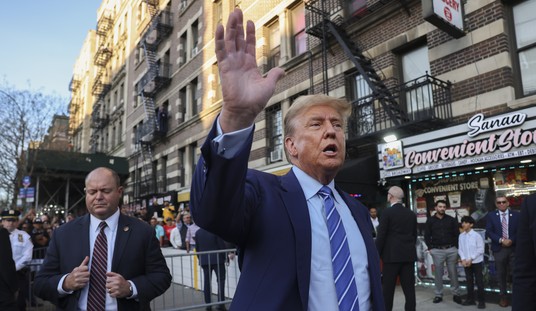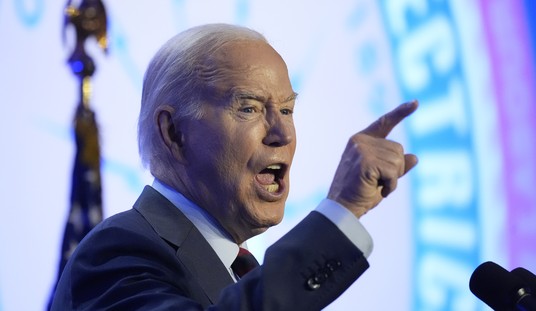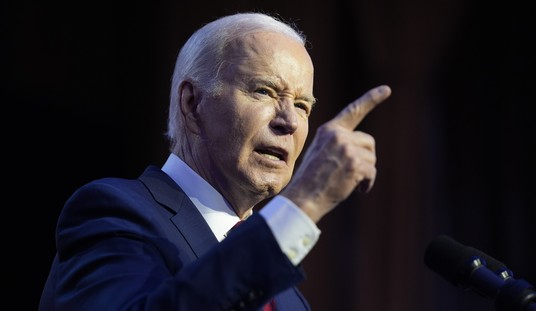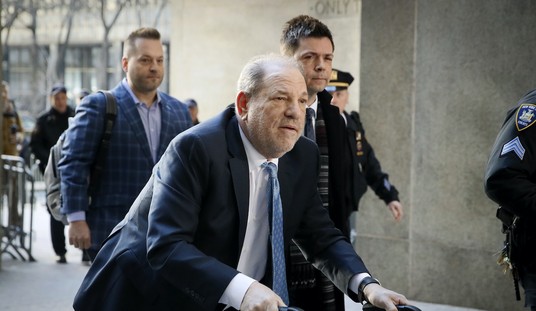The Democrat impeachment managers completed their closing arguments on Monday with more insanity, claiming the President was going to trade Alaska to Russia for election support, citing Harry Potter, predicting that Jared Kushner would be delegated the decision authority on “going to war,” and other fantasies:
Adam Schiff:
If Trump isn't removed he "could offer Alaska to the Russians in exchange for support in the next election or decide to move to Mar-a-Lago permanently and leave Jared Kushner to run the country, delegating to him the decision whether they go to war." pic.twitter.com/VBzkonqpmH
— Daily Caller (@DailyCaller) February 3, 2020
Meanwhile, the President’s team methodically dissected and demolished the Democrats’ “case” for impeachment. Deputy White House Counsel Patrick Philbin took them to the woodshed in his closing arguments, as described here. And Jay Sekulow sealed the deal with his remarks, as captured below:
Sekulow: … I want to focus on one last point. We believe that we have established overwhelmingly that both articles of impeachment failed to allege impeachable offenses, and that therefore, both articles one and two must fail. This entire campaign of impeachment that started from the very first day that the President was inaugurated was a partisan one, and it should never happen again. For three years, this push for impeachment came straight from the President’s opponents, and when it finally reached a crescendo, it put this body – the United States Senate – into a horrible position.
I want to start by taking a look back. On the screen is a Washington Post headline on January 20, 2017: “The Campaign to impeach President Trump has begun.” This was posted 19 minutes after he was sworn in. I also want to play a video where members as early as January 15, 2017 – before the President was sworn into office – were calling for his impeachment. (video of: Jamey Raskin, D-MD; Maxine Water, D-CA; Al Green, D-TX; Steve Cohen, D-TN; Joachin Castro, D-TX; Adriano Espaillot, D-NY; Ilhan Omar, D-MN; Alexandria Ocasio-Cortez, D-NY; Rashida Tlaib, D-MI; Elizabeth Warren, D-MA; Jerry Nadler, D-NY; and others all calling for impeachment before July 2019). One of the members of the House of Representatives said, “We’re bringing these articles of impeachment so he doesn’t get elected again. And here we are, ten months before an election doing exactly what they predicted.
The whistleblower’s lawyer, Mark Zaid, sent out a tweet on January 30, 2017, saying “#Couphas started. First of many steps. #rebellion. #impeachment will follow immediately.” And here we are. What this body, what this nation, and what this president has just endured – what the House managers have forced upon this great body is unprecedented and unacceptable. This is precisely and exactly what the Founders feared. This was the first totally partisan presidential impeachment in our nation’s history, and it should be our last.
What the House Democrats have done to this nation, to the Constitution, to the office of the president, to the President himself, and to this body is outrageous. They have cheapened the awesome power of impeachment, and unfortunately of course, the country is not better for that. We urge this body to dispense with these partisan articles of impeachment for the sake of the nation, for the sake of the Constitution.
As we have demonstrably proved, the articles are flawed on their face. They are the product of a reckless impeachment inquiry that violated all notions of due process and fundamental fairness. And then incredibly, when these articles were finally brought to this chamber without a single Republican vote, the managers then claimed that now they need more process. Now they need more witnesses. That all of the witnesses they compiled and all of the testimony that you heard was not enough. That your job was to do their job – the one, frankly, they failed to do.
We’ve already said many times the charges themselves do not allege a crime or a misdemeanor, let alone a high crime or misdemeanor. There is nothing in the charges that could permit the removal of a duly elected president or warrant the negation of an election and the subversion of the American people’s will. That should be whatever party you’re affiliated with [should be concerned about]. You’re being asked to do this when tonight citizens of Iowa are going to be caucusing for the first caucus for the presidential election season for the Democrat Party – tonight!
I think it’s one thing that’s clear. The President has a concern about other countries carrying their fair share of burdens of financial aid. No one can doubt – and I think we’ve clearly set forth the issue of corruption in Ukraine. The President’s and the Administration’s policy on evaluating foreign aid and the conditions upon which it’s given have been clear. The bottom line is that the President’s opponents don’t like the President, and they really don’t like his policies. They objected to the fact that the President chose not to rely each and every time on the advice of some of his subordinates even though he – not those unelected bureaucrats – was elected to office. The President, under our constitutional structure, is the one who decides our nation’s foreign policy. Here is a perfect example. The House managers brought this up frequently. LTC Vindman. He admitted on page 155 of his transcript of his testimony that he “did not know if there was a crime or anything of that nature,” but that he “had deep policy concerns.”
So there you have it. The real issue is policy disputes. Elections have consequences; we all know that, and if you do not like the policies of a particular administration or a particular candidate, you are free and welcome to vote for another candidate. But the answer is elections, not impeachment. To be clear, in our country, in the United States, the President, elected by the American people is – in the words of the Supreme Court – is the sole organ of the federal government in the field of international relations and foreign policy for our government – no unelected bureaucrats, not unhappy Democrats in the House of Representatives. And however you want to define high crimes and misdemeanors, there is no definition that includes disagreeing with a policy decision as an acceptable ground for removal of the president of the United States. None.
The first article of impeachment is therefore constitutionally invalid and should be immediately rejected by the Senate.
Now as to the second article of impeachment, President Trump in no way obstructed Congress. The President acted with extraordinary transparency by declassifying releasing of the transcript of the July 25th call – and the earlier call. It is that July 25th call which is purportedly at the heart of the articles of impeachment. He did so soon after the inquiry was announced. And despite the fact that privileges apply that could have been asserted, he released them anyway in order to facilitate the House’s inquiry. He cut through all of it – all of the hearsay – all of the histrionics – to get the transcript out.
Now, I want to take a moment, because … Pat Philbin addressed this idea of privilege. I’ve heard over and over again, phrases like, “cover-up – that the assertion of a privilege is a cover-up.” Here’s what the Supreme Court of the United States has said about privileges in a variety of contexts. “To punish a person because he has done what the law allows him to do is a due process violation of the basic order. And for an agent of the state to pursue a course of action whose objective is to penalize a person’s reliance on his constitutional rights is patently unconstitutional.” And how much more so when you’re talking about the president of the United States?
How about this? And this goes to the context of assertion of other constitutional privileges. The allegation is that if you assert a privilege, you are assumed to be guilty. That’s been the assertion. Why would you do that? We’ve explained it at great length … we won’t go over it again – what it means to separation of powers and the functioning of our government – but I will say this. As the Supreme Court has recognized in other contexts with other privileges, that “privileges serve to protect the innocent who otherwise might be ensnared by ambiguous circumstances.” In another Supreme Court case, Quinn vs. the United States, “it was generally regarded then as now as a privilege of great value – a protection of the innocent.” The opinion goes on to say that “the safeguard against heedless or unfounded or tyrannical prosecutions.”
I traced through how it all started – three years ago. How all this began. There is no point to go over that because that evidence is undisputed, and the FISA court’s recent orders put that in fair play. We talked about the fact that the House violated its own fundamental rules in a series of unlawful subpoenas. Mr. Philbin laid that out in great detail. But I do think it’s important to note that when seeking the advice of the President’s closest advisers, despite the well-known bipartisan guidance from the Department of Justice regarding immunity, the House managers act as if it does not exist. They sought testimony on matters from the executive branch’s confidential internal decision-making on matters of foreign relations and national security, and that is when protections are at their highest level.
Let’s not forget that the House barred the attendance of executive branch counsel at witness proceedings when executive branch members were being examined. Notwithstanding these substantial abuses of process, the executive branch responded to each and every subpoena and identified the specific deficiencies found in each. You cannot just remove constitutional violations by saying you didn’t comply. You’ve heard that one recipient of a subpoena did seek a declaratory judgment as to the validity of the subpoena that he had received and was set up to go to court. A judge was going to make a decision. The House withdrew the subpoena and removed the recipient’s case before the court could rule. Now was it because they didn’t like the judge that was selected, was it because they didn’t like the way the ruling was going to go, was it because they didn’t mean to have that witness in the first place? Whatever the reason, there is one undisputed fact. As the case was in court, they mooted it out by removing the subpoena.
The assertion of valid constitutional privileges cannot be an impeachable offense. And that’s what article two is based on – the obstruction of Congress. For the sake of the Constitution, for the sake of the office of the President, this body must stand as a steady bulwark against this reckless and dangerous proposition. It doesn’t just affect this president; it effects every man or woman who occupies that high office. So as we said with the first article of impeachment, we believe the second article of impeachment is invalid and should also be rejected.
In passing the first article of impeachment, the House attempted to usurp the President’s constitutional power to determine policy, especially foreign policy. In passing the second article of impeachment, the House attempted to control the constitutional privileges and immunities of the executive branch. All of this while simultaneously disrespecting the Framers’ system of checks and balances which designates the judicial branch as the arbiter of inter-branch disputes. By approving both articles, the House of Representatives violated our constitutional order and illegally abused their power of impeachment in order to obstruct the President’s ability to faithfully execute the duties of his office. These articles fail on their face, as they do not meet the constitutional standards for impeachable offenses. No amount of testimony could change that fact.
We’ve already discussed some of the specifics. Alexander Hamilton has been quoted a lot, and there’s a reason. What has occurred over the past two weeks – really the past three months – is exactly what Alexander Hamilton and other Founders of our great country feared. I believe that Hamilton was prophetic in Federalist 65 when he warned how impeachment had the ability to “agitate the passions of the whole community and to divide it into parties more or less friendly or inimical to the accused.” He warned that impeachment would “connect itself with pre-existing factions and would enlist all their animosities, their partialities, influences and interests on one side or on the other.” He continued, “The Convention, it appears, thought the Senate most fit as the depository of this most important trust. Those who best can discern the intrinsic difficulty of the thing will be the least hasty in condemning that opinion and will be most inclined to allow due weight to the arguments which may be supposed to have produced it.” In the same Federalist 65, Hamilton regarded the members of this Senate “not only as the inquisitors for the nation but as the representatives of the nation as a whole.” He said these words, “Where else but in the Senate could have been found a tribunal sufficiently dignified or significantly independent? What other body would be likely to feel confident enough in its own situation to preserve unawed and uninfluenced the necessary and impartiality of the individual accused and the representatives of the people, his accusers?”
You took an oath. They questioned the oath. You’re sitting here as a trier of fact; they said the Senate is on trial.
Based on all of the presentations that we’ve made, …. we believe that both articles should immediately be rejected.
….
I ask that this partisan impeachment come to an end. To restore our constitutional balance – for that is what is in our view what justice demands and the Constitution requires.
Jay Sekulow delivered a slam dunk. If only the Senators remember these summary points as they vote today:
- The House ran an impeachment campaign for the last three years, starting even before the President was sworn in on Inauguration Day 2017.
- The House ran the first totally partisan presidential impeachment in our nation’s history
- The articles of impeachment are the product of a reckless impeachment inquiry that violated all notions of due process and fundamental fairness
- The articles of impeachment do not allege a crime or a misdemeanor, let alone a high crime or misdemeanor
- The President under our constitutional structure – not unelected bureaucrats – is the one who decides our nation’s foreign policy
- There is no definition of “high crimes and misdemeanors” that includes disagreeing with a policy decision as an acceptable ground for removal of the president of the United States
- The assertion of valid constitutional privileges cannot be an impeachable offense: “To punish a person because he has done what the law allows him to do is a due process violation of the basic order. And for an agent of the state to pursue a course of action whose objective is to penalize a person’s reliance on his constitutional rights is patently unconstitutional.”
- The first article of impeachment usurps the President’s constitutional power to determine policy
- The second article of impeachment attempts to control the constitutional privileges and immunities of the executive branch
- By approving both articles, the House of Representatives violated our constitutional order and illegally abused their power of impeachment in order to obstruct the President’s ability to faithfully execute the duties of his office
- The articles of impeachment do not meet the constitutional standards for impeachable offenses. No amount of testimony could change that fact.
The end.














Join the conversation as a VIP Member